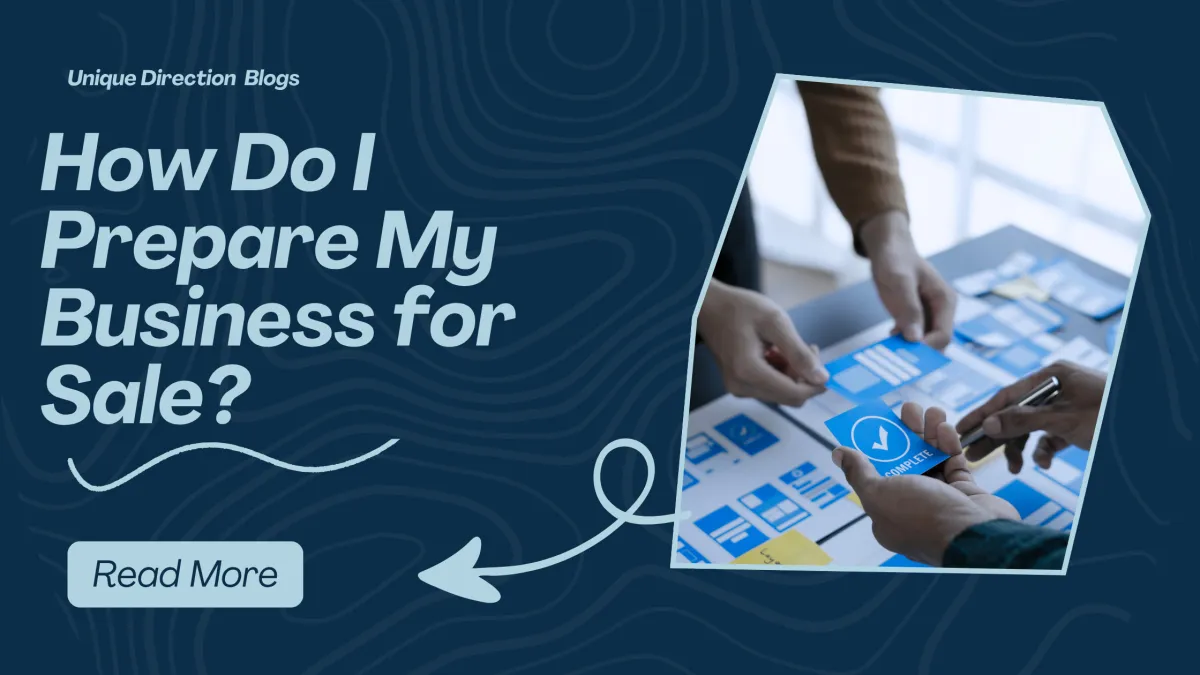
How Do I Prepare My Business for Sale?
How Do I Prepare My Business for Sale?
Buyers don’t buy potential. They buy proof.
So if you’re even thinking about selling, the best time to start preparing is now — not when you get an offer, not when you hit a revenue goal, and certainly not when you’re already exhausted.
Why? Because the businesses that sell fastest, cleanest, and at the highest multiples are the ones that have prepared early — even years before a deal.
What Buyers Actually Look For
When considering a business exit, founders often concentrate on metrics such as top-line revenue or EBITDA. However, the reality is that buyers are willing to pay a premium for companies that present a clear, comprehensible structure, a seamless transfer process, and the potential for growth without the heavy reliance on the founder. This understanding is crucial in maximizing the valuation of your business.
So, what do buyers actually scrutinize when evaluating a potential acquisition?
Firstly, clean and accurate financials are non-negotiable. They are the bedrock of a buyer's confidence in the health and viability of a business. Inconsistencies or inaccuracies in financial reporting can significantly undermine a buyer’s trust and, consequently, the perceived value of your company.
Secondly, documented systems and operations are a testament to a business's ability to maintain efficiency and consistency. This documentation reduces owner dependency, ensuring that the company can operate smoothly with or without the founder. It's a clear indicator that the business is well-organized and that a new owner can step in without facing a steep learning curve.
The presence of recurring or predictable revenue streams is another key factor that buyers seek. This reduces the perceived risk, as it suggests a stable cash flow and a solid customer base. It also indicates that the business has a reliable income, which is less likely to be disrupted during the transition period.
A strong leadership structure further alleviates founder reliance. It demonstrates that the business has capable managers who can drive the company forward, even in the absence of the founder. This is crucial for buyers who want to ensure business continuity and have confidence in the team they inherit.
Low customer or supplier concentration is another attribute that can enhance a business's appeal. Overreliance on a limited number of customers or suppliers can pose a significant risk. Diversification in these areas suggests a resilient business model that is less vulnerable to the loss of any single client or supplier.
Legal and intellectual property (IP) clarity also plays a vital role. Buyers seek assurance that there are no looming legal issues and that the IP, which often constitutes a significant portion of a business's value, is properly secured and transferable.
Lastly, buyers are attracted to businesses that present clear and credible growth opportunities. They are not just buying the present state of the company; they are investing in its future potential. Therefore, a well-defined roadmap for growth that doesn't hinge solely on the founder's involvement can substantially increase a business's attractiveness and valuation.
Neglecting any of these aspects can lead to a reduced valuation or even cause a deal to stall. To ensure a successful business exit, founders must address each of these areas to reduce owner dependency and make the business an attractive proposition for potential buyers.
DIY Approach: Start Getting Exit-Ready Now
Here’s what you can do today to start preparing:
1. Organise your financials
Make sure your management accounts, tax returns, and forecasts are accurate, consistent, and easy to access.
2. Reduce founder reliance
Start shifting responsibilities to senior team members. Build in succession thinking now — not later.
3. Document your key processes
From operations to sales, write down how things are done. Buyers need to know it’s not all in your head.
4. Clean up contracts and compliance
Review supplier, employee, and customer contracts. Fix gaps, renew expired terms, and get everything in writing.
5. Identify and protect your IP
Logos, brand assets, customer data, proprietary tools — all of it should be clearly owned and legally protected.
6. Build a short ‘pitch pack’
Create a one-page summary of your business model, financials, team, and future roadmap. This will sharpen your exit narrative.
What Most Founders Miss
You don’t get second chances in due diligence.
The moment a buyer starts digging, they’re not just validating what you told them — they’re looking for reasons to discount the deal, stall it, or walk away.
Preparation isn't about being perfect. It’s about being credible.
More Reads:
1.How can I increase the value of my company before selling?
